

Conservative Christian media mogul Pat Robertson died Thursday at the age of 93, leaving behind a massive estate that almost certainly entails some special circumstances from a tax and legal standpoint.
Robertson, who founded The Christian Broadcasting Network, Regent University, the American Center for Law and Justice, Operation Blessing and International Family Entertainment, was a political force who helped shape modern-day conservatism in the U.S. As longtime televangelist host of "The 700 Club," he helped expand the influence of religion in today’s Republican Party, and he was known for divisive and often outrageous comments on numerous social issues.
Robertson was also extremely wealthy.
“Especially with prominent religious figures who have dabbled in politics and changed the landscape in terms of the role of religion in our country, his estate assets may have some unique characteristics,” Priya Prakash Royal, managing attorney at the Royal Law Firm, said in an email.
In addition to an estimated hundreds of millions of dollars generated by the initial public offering of Robertson-owned International Family Entertainment in the early ’90s, the televangelist had a sprawling, 11,000-square-foot luxury retreat on 27 acres in Bath County, Virginia, as well as other potential assets that could be part of his estate, Royal noted.
“He may have intellectual property rights including religious recordings, ancillary interests in the network, and maybe even rights of publicity, as his name and image carries value in the evangelical community. Publishing under his name may be profitable, which means it could be an asset of the estate.” Royal said.
“However, as a religious leader, with proper planning, most if not all his taxable assets could be part of charitable planning, where they are already owned by foundations or religious entities that he derived monetary benefits from without ownership interest, or has dedicated to giving to charitable institutions he valued or created to continue his legacy, while providing for his family as they continue his work,” she added.
That means big tax breaks could be possible, Royal noted.
"Pat Robertson’s estate will likely face this [intellectual property] issue, because he published many books in his career. He may have also licensed his intellectual property and his image," Asher Rubinstein, partner at Gallet Dreyer & Berkey, said in an email. "It is a good idea to have an IP attorney preserve and assign the copyrights. IP is frequently held in a trust with income payable to beneficiaries, including religious charities."
A question that arises as well is whether the original copy of a sermon from a notable person has value, Rubinstein said. "Such an item should be carefully considered by estate planning counsel with respect to inheritance, tax planning and asset preservation."
“These transfers before or after death could be deductions for both income and estate taxes, and he could leave a legacy of over $100 [million] with no taxable estate regardless,” she said
The case shows the potential in having a trust, “allow[ing] for a more deliberate distribution of assets,” David Watson, a Milwaukee-based estate-planning lawyer, said in an email.
“Conversely, in the absence of a trust, his estate would be subject to distribution according to Virginia intestacy statutes, potentially diverging from his intentions as a religious leader,” Watson said. “Given his dedication to charitable efforts, one can reasonably assume that he desired to perpetuate the work of The 700 Club.”
Another conservative Christian figure, Jerry Falwell, left a $29 million life insurance policy to Liberty University, the institution he founded, along with his Thomas Road Baptist Church, which received $5 million, after Falwell died in 2007, according to Insurance Journal. The payment wiped out the considerable debt the university had faced.
“Assuming that Pat did indeed establish a trust and included provisions to allocate a considerable portion to The 700 Club or other nonprofit organizations, he would have alleviated concerns regarding estate tax implications,” Watson said. “Such bequests to nonprofit organizations are deductible against the estate's value, thereby reducing the burden of estate taxes. Notably, current tax laws permit an unrestricted number of charitable bequests to be made against an estate, making this a potent strategy for mitigating estate tax liabilities.”
Charitable trusts prepared ahead of time are a way for religious leaders to extend control of their donated assets beyond their lifetimes, he said.
“It is noteworthy that charitable trusts can manifest in many forms, such as the versatile options of a charitable remainder trust or a charitable lead trust,” Watson said. “Each of these trust variations presents unique tax benefits and a high degree of flexibility, allowing religious leaders to tailor their approach to their specific objectives and circumstances.”

By listening for what truly matters and where clients want to make a difference, advisors can avoid politics and help build more personal strategies.

JPMorgan and RBC have also welcomed ex-UBS advisors in Texas, while Steward Partners and SpirePoint make new additions in the Sun Belt.

Counsel representing Lisa Cook argued the president's pattern of publicly blasting the Fed calls the foundation for her firing into question.

The two firms violated the Advisers Act and Reg BI by making misleading statements and failing to disclose conflicts to retail and retirement plan investors, according to the regulator.

Elsewhere, two breakaway teams from Morgan Stanley and Merrill unite to form a $2 billion RIA, while a Texas-based independent merges with a Bay Area advisory practice.
Orion's Tom Wilson on delivering coordinated, high-touch service in a world where returns alone no longer set you apart.
Barely a decade old, registered index-linked annuities have quickly surged in popularity, thanks to their unique blend of protection and growth potential—an appealing option for investors looking to chart a steadier course through today's choppy market waters, says Myles Lambert, Brighthouse Financial.
